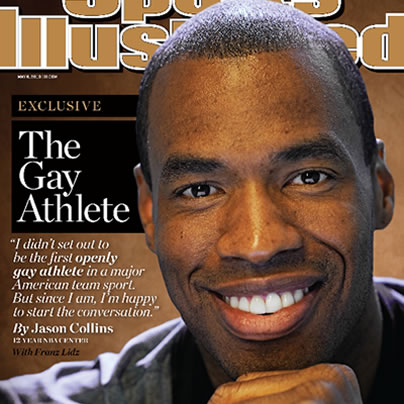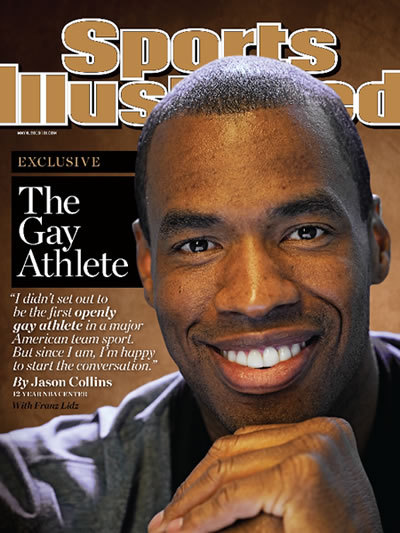National
Collins remains unsigned 4 months after coming out
Will former Wizard find a new team after announcing he’s gay?


Traded to Washington D.C. from Boston in February, with this week’s Sports Illustrated piece, the Wizards’ center Jason Collins becomes the first active openly gay player in history in the four most-followed American professional sports leagues. (Image courtesy of Sports Illustrated)
More than four months after he became the first male athlete who actively plays in a major American sports professional league to come out as gay, former Washington Wizards center Jason Collins has yet to sign with another team.
Both the Pistons and Nets have passed on signing Collins, according to a CBS News report. Collins averaged one point and one rebound per game last year while with the Celtics and Wizards.
NBA training camps begin in late September. ESPN reported that, “An informal survey of league executives at Las Vegas Summer League suggests that Collins, who remains a free agent, stands a good chance to be in uniform on opening night this fall as teams flesh out their rosters with 12th, 13th and 14th men in the weeks leading up to training camp.”
FIND MORE OF THE WASHINGTON BLADE SPORTS ISSUE HERE.
Collins has repeatedly declined the Washington Blade’s requests for an interview since he announced he’s gay in an op-ed that Sports Illustrated published in its May 6 edition, but he has appeared at a number of LGBT-specific events since then. These include attending an LGBT fundraiser for the Democratic National Committee in New York City on May 29 that First Lady Michelle Obama attended and marching in Boston’s annual Pride parade in June with Massachusetts Rep. Joseph P. Kennedy, III, with whom he lived while they attended Stanford University.
Collins, 34, introduced Seattle rappers Macklemore and Ryan Lewis at the MTV Video Music Awards in Brooklyn, N.Y., on Aug. 25 before they performed their song “Same Love” that advocates for marriage rights for same-sex couples.
“I was certain that my world would fall apart if anyone knew,” Collins wrote in his Sports Illustrated op-ed. “Yet when I acknowledged my sexuality I felt whole for the first time.”
NBA Commissioner David Stern, Wizards President Ernie Grunfeld, D.C. Mayor Vincent Gray, Kobe Bryant of the Los Angeles Lakers, New York City Council Speaker Christine Quinn and Human Rights Campaign President Chad Griffin are among those who applauded Collins after he came out.
“His coming out will have a positive impact on an untold amount of lives,” retired tennis champion Martina Navratilova, who came out in 1981, told the Washington Blade during a June interview. “It’s just adding to the groundswell of acceptance.”
President Obama also reached out to Collins after he came out.
“I told him I couldn’t be prouder of him,” Obama told reporters after Sports Illustrated posted Collins’ op-ed to its website in late April. “One of the extraordinary measures of progress that we’ve seen in this country has been the recognition that the LGBT community deserves full equality, not just partial equality, not just tolerance, but a recognition that they’re fully a part of the American family.”
U.S. Supreme Court
Supreme Court to consider bans on trans athletes in school sports
27 states have passed laws limiting participation in athletics programs

The U.S. Supreme Court on Thursday agreed to hear two cases involving transgender youth challenging bans prohibiting them from participating in school sports.
In Little v. Hecox, plaintiffs represented by the ACLU, Legal Voice, and the law firm Cooley are challenging Idaho’s 2020 ban, which requires sex testing to adjudicate questions of an athlete’s eligibility.
The 9th U.S. Circuit Court of Appeals described the process in a 2023 decision halting the policy’s enforcement pending an outcome in the litigation. The “sex dispute verification process, whereby any individual can ‘dispute’ the sex of any female student athlete in the state of Idaho,” the court wrote, would “require her to undergo intrusive medical procedures to verify her sex, including gynecological exams.”
In West Virginia v. B.P.J., Lambda Legal, the ACLU, the ACLU of West Virginia, and Cooley are representing a trans middle school student challenging the Mountain State’s 2021 ban on trans athletes.
The plaintiff was participating in cross country when the law was passed, taking puberty blockers that would have significantly reduced the chances that she could have a physiological advantage over cisgender peers.
“Like any other educational program, school athletic programs should be accessible for everyone regardless of their sex or transgender status,” said Joshua Block, senior counsel for the ACLU’s LGBTQ and HIV Project. “Trans kids play sports for the same reasons their peers do — to learn perseverance, dedication, teamwork, and to simply have fun with their friends,” Block said.
He added, “Categorically excluding kids from school sports just because they are transgender will only make our schools less safe and more hurtful places for all youth. We believe the lower courts were right to block these discriminatory laws, and we will continue to defend the freedom of all kids to play.”
“Our client just wants to play sports with her friends and peers,” said Lambda Legal Senior Counsel Tara Borelli. “Everyone understands the value of participating in team athletics, for fitness, leadership, socialization, and myriad other benefits.”
Borelli continued, “The U.S. Court of Appeals for the Fourth Circuit last April issued a thoughtful and thorough ruling allowing B.P.J. to continue participating in track events. That well-reasoned decision should stand the test of time, and we stand ready to defend it.”
Shortly after taking control of both legislative chambers, Republican members of Congress tried — unsuccessfully — to pass a national ban like those now enforced in 27 states since 2020.
Federal Government
UPenn erases Lia Thomas’s records as part of settlement with White House
University agreed to ban trans women from women’s sports teams

In a settlement with the Trump-Vance administration announced on Tuesday, the University of Pennsylvania will ban transgender athletes from competing and erase swimming records set by transgender former student Lia Thomas.
The U.S. Department of Education’s Office for Civil Rights found the university in violation of Title IX, the federal rights law barring sex based discrimination in educational institutions, by “permitting males to compete in women’s intercollegiate athletics and to occupy women-only intimate facilities.”
The statement issued by University of Pennsylvania President J. Larry Jameson highlighted how the law’s interpretation was changed substantially under President Donald Trump’s second term.
“The Department of Education OCR investigated the participation of one transgender athlete on the women’s swimming team three years ago, during the 2021-2022 swim season,” he wrote. “At that time, Penn was in compliance with NCAA eligibility rules and Title IX as then interpreted.”
Jameson continued, “Penn has always followed — and continues to follow — Title IX and the applicable policy of the NCAA regarding transgender athletes. NCAA eligibility rules changed in February 2025 with Executive Orders 14168 and 14201 and Penn will continue to adhere to these new rules.”
Writing that “we acknowledge that some student-athletes were disadvantaged by these rules” in place while Thomas was allowed to compete, the university president added, “We recognize this and will apologize to those who experienced a competitive disadvantage or experienced anxiety because of the policies in effect at the time.”
“Today’s resolution agreement with UPenn is yet another example of the Trump effect in action,” Education Secretary Linda McMahon said in a statement. “Thanks to the leadership of President Trump, UPenn has agreed both to apologize for its past Title IX violations and to ensure that women’s sports are protected at the university for future generations of female athletes.”
Under former President Joe Biden, the department’s Office of Civil Rights sought to protect against anti-LGBTQ discrimination in education, bringing investigations and enforcement actions in cases where school officials might, for example, require trans students to use restrooms and facilities consistent with their birth sex or fail to respond to peer harassment over their gender identity.
Much of the legal reasoning behind the Biden-Harris administration’s positions extended from the 2020 U.S. Supreme Court case Bostock v. Clayton County, which found that sex-based discrimination includes that which is based on sexual orientation or gender identity under Title VII rules covering employment practices.
The Trump-Vance administration last week put the state of California on notice that its trans athlete policies were, or once were, in violation of Title IX, which comes amid the ongoing battle with Maine over the same issue.
New York
Two teens shot steps from Stonewall Inn after NYC Pride parade
One of the victims remains in critical condition

On Sunday night, following the annual NYC Pride March, two girls were shot in Sheridan Square, feet away from the historic Stonewall Inn.
According to an NYPD report, the two girls, aged 16 and 17, were shot around 10:15 p.m. as Pride festivities began to wind down. The 16-year-old was struck in the head and, according to police sources, is said to be in critical condition, while the 17-year-old was said to be in stable condition.
The Washington Blade confirmed with the NYPD the details from the police reports and learned no arrests had been made as of noon Monday.
The shooting took place in the Greenwich Village neighborhood of Manhattan, mere feet away from the most famous gay bar in the city — if not the world — the Stonewall Inn. Earlier that day, hundreds of thousands of people marched down Christopher Street to celebrate 55 years of LGBTQ people standing up for their rights.
In June 1969, after police raided the Stonewall Inn, members of the LGBTQ community pushed back, sparking what became known as the Stonewall riots. Over the course of two days, LGBTQ New Yorkers protested the discriminatory policing of queer spaces across the city and mobilized to speak out — and throw bottles if need be — at officers attempting to suppress their existence.
The following year, LGBTQ people returned to the Stonewall Inn and marched through the same streets where queer New Yorkers had been arrested, marking the first “Gay Pride March” in history and declaring that LGBTQ people were not going anywhere.
New York State Assemblywoman Deborah Glick, whose district includes Greenwich Village, took to social media to comment on the shooting.
“After decades of peaceful Pride celebrations — this year gun fire and two people shot near the Stonewall Inn is a reminder that gun violence is everywhere,” the lesbian lawmaker said on X. “Guns are a problem despite the NRA BS.”




















